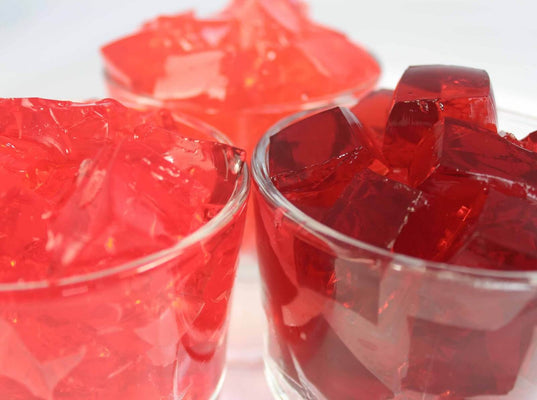Two terms frequently come up when discussing dietary items that Muslims may or may not consume: halal and haram. Halal is Arabic for legal, and haram is Arabic for unlawful. Strict regulations govern how animals must be butchered and the products prohibited from being used in food.
Get a free sample pack!
Consuming meals, beverages, or medications that include gelatin made from pig skin or other impure materials is haram. In light of the fact that gelatin is frequently made from pig bones and skin, it presents a particularly intriguing problem for the halal diet.
However, one can get gelatin from animals other than the pig, killed according to the rules, and it will have the same effects when used to make food or medicine. So, gelatine can be halal if made according to the shariah rules.
What is Gelatine?
Gelatine, a transparent, flavourless protein, thickens and solidifies soups, marshmallows, and traditional aspic moulds, among other dishes. It is derived from the collagen of animals and is frequently used in jellies and gummies. Additionally, it's applied in cosmetics, pharmaceutical capsules, personal care items, and photography.
Collagen is a protein found in pigs, cows, and other animals' skin, connective tissue, and bones. Fish bones can also be used to make collagen. By boiling the bones, the protein gets removed from them. After this, as the protein cools, it partially solidifies. Before it is dried and packed, commercially available gelatin is purified for culinary use.
There are plant-based gelatins, too, such as pectin. These act as gelling agents are also available, and they are not chemically linked to animal gelatins.
If one is looking for a 100 percent vegan and halal item that is healthy, too, one can eat Chewwies gummies without hesitation! And in case of any questions or additional information, visit here.

What Do You Mean By Halal Gelatine?
Halal gelatine is an alternative source of gelatine produced by Islamic Law, which forbids the use of any pig products. This gelatine serves the same purposes as regular pig-based gelatine. Halal gelatine plays a significant role in food, beauty products, photography, and the manufacture of particular paper types.
Jellies, gummies, ice cream, pastries, biscuits, and cakes are just a few of the foods that contain gelatine. Additionally, it is utilised in veterinary applications and non-food items like medical ones. Food producers can use a few veggie gelatine replacements in places where halal gelatine isn't readily available. These gelatine replacements of vegetable origin serve the same purpose.
Is Gelatine Halal?
Gelatine is used in many sweets and other food items; therefore, for Muslims, it's crucial to know whether or not it's halal. A Muslim must, for instance, exercise caution when eating desserts like ice cream, cheesecakes, and sherbet unless they are made with halal gelatine. Muslims can only be sure a product contains halal gelatine if it is specifically marked as such on the packaging.
Conclusion
In summary, gelatin can be categorised as halal if it only contains animal parts and Islamic law strictly performs the rules. Such as, during the slaughtering, the slaughterer must recite Quranic prayers. It is essential that there is not a single pig or pork ingredient.


